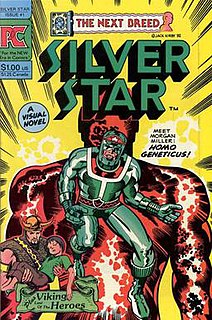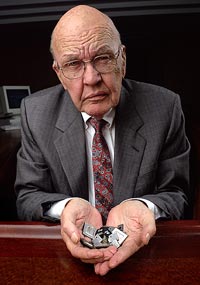This page is based on this
Wikipedia article Text is available under the
CC BY-SA 4.0 license; additional terms may apply.
Images, videos and audio are available under their respective licenses.
Jack Johnson may refer to:

Kirby Krackle is an artistic convention in superhero and science fiction comic books and similar illustrations, in which a field of black, pseudo-fractal images is used to represent negative space around unspecified kinds of energy. Kirby Krackles are typically used in illustrations of explosions, smoke, the blasts from ray guns, "cosmic" energy, and outer space phenomena.

Jack is a male given name. In recent decades, Jack has become one of the most common names for boys in many English-speaking countries. While Jack is now a proper name in its own right, in English, it was traditionally used as a diminutive form of John. It can also be used as a diminutive for: Jacob, Jason, Jonathan, Johann, Johannes, Joachim and sometimes for James, from its French form Jacques. It is also used as a female given name and as a surname to a lesser extent.
Jack Thompson may refer to:
William Kirby may refer to:
Kirby is a surname. Notable people with the surname include:
Jack Curtis may refer to:
Jack White is an American musician and singer-songwriter.
Jack Taylor may refer to:
Justice Traps The Guilty was an American comic book title, a publication of the crime comics genre created by Joe Simon and Jack Kirby and published by Prize Comics from 1947–1958. It followed the successful revamping of Headline Comics by Simon and Kirby, beginning in March 1947.

Silver Star is an American comic book superhero series created, written, and drawn by Jack Kirby, first published by Pacific Comics in 1983. Featuring a title character who becomics super-powered due to genetic mutation, the series continued Kirby's run of creator-owned work. Reprints of the original series and new stories based on it have subsequrently been published by other comic book companies.
Street Code is both the short, ten page autobiographical comic story and the 2009 mini-comic by American writer-artist Jack Kirby. Both Bill Sienkiewicz and Jeff Zapata consider it among Kirby's greatest works, and it supplanted all other works in the minds of Jack and wife Roz. Roz appreciated it so much she framed the two page spread from the story and gave it pride of place on her wall. It was commissioned by Richard Kyle in 1983 but did not see print until 1990 in Argosy vol.3 #2, with lettering by Bill Spicer. The story was shot from Kirby's pencils. Kyle intended to print it with a colored tone behind it, which Kirby requested not be too colorful, but rather drab to suit the times. Kyle said
"I was troubled by the production errors in "Street Code", ... I should have served Jack better. But, although a hundred comic editors could have asked for this story at any time in Jack's career, they never did. "Street Code" lives because of Argosy, and will be remembered because of Jack Kirby - and because it says what the graphic story could have been and may still become."




